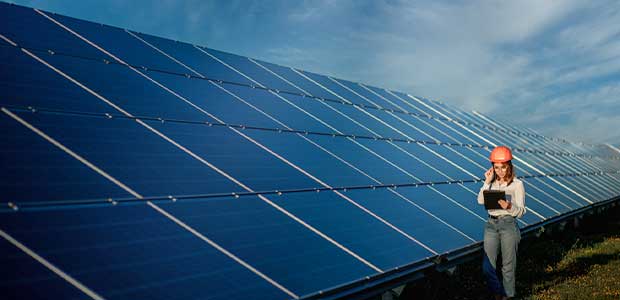The Future of Energy: How Solar Energy Is Shaping Tomorrow'S Globe
As the international power landscape advances, solar power becomes an essential pressure driving this transformation. Current innovations in photovoltaic or pv technology and power storage are enhancing the efficiency and availability of solar power, motivating a shift in the direction of sustainable practices across different sectors. The implications prolong past power generation, affecting economic development and environmental plan. The concern remains: just how will these developments improve our everyday lives and societal frameworks in the coming years? Exploring this vibrant interplay may expose unforeseen opportunities and difficulties that exist ahead.
The Surge of Solar Innovation
The surge of solar technology has actually noted a substantial shift in the global power landscape, driven by advancements in solar systems and power storage space remedies. As the promote lasting power resources intensifies, solar power has arised as a leading challenger because of its intrinsic advantages, including wealth, ease of access, and very little ecological effect.
Recent advancements in photovoltaic panel effectiveness, such as the development of bifacial panels and perovskite materials, have substantially increased energy capture and conversion prices. These advancements allow solar installations to create even more power from the same amount of sunlight, enhancing their viability as a key power source. Additionally, enhancements in energy storage space innovations, such as lithium-ion batteries, have dealt with the intermittency challenges linked with solar energy, allowing far better integration right into power grids and supplying reliable energy also during non-sunny durations.
Additionally, the reducing price of solar modern technology has actually made it progressively accessible to both domestic and commercial fields - Simply Solar Illinois. Governments and companies worldwide are spending in solar facilities, identifying its potential to add to power independence and carbon decrease goals. This momentum indicates that solar technology will certainly remain to play a critical duty fit the future of energy
Economic Impact of Solar Power
With the boosting fostering of solar energy, substantial financial benefits are coming to be evident across numerous markets. The solar market has become a significant contributor to job creation, with numerous positions created in manufacturing, installation, and maintenance. These work typically offer competitive earnings, promoting regional economic situations and decreasing unemployment prices.
Additionally, solar power can cause reduced energy costs for customers and organizations alike. Simply Solar Illinois. By utilizing sunlight, households and business can lower their reliance on nonrenewable fuel sources, eventually lowering utility expenses. This cost-effectiveness is specifically beneficial for low-income family members, that might otherwise face energy poverty
Along with guide cost savings, solar power boosts investments in infrastructure and technology. Federal governments and personal entities are increasingly funding solar tasks, driving innovation and enhancing power security. This change not just diversifies energy portfolios yet also draws in international financial investments, boosting national economies.

Ecological Benefits of Solar Power
A growing body of evidence highlights the considerable environmental advantages of solar energy, placing it as an essential part in combating environment adjustment. Solar energy production significantly reduces greenhouse gas emissions contrasted to fossil gas. By taking advantage of sunlight, photovoltaic panels produce electricity without releasing co2 or other harmful pollutants, adding to cleaner air and a much healthier environment.


The lifecycle of photovoltaic panels also demonstrates environmental advantages; they are increasingly made for recyclability, reducing waste and promoting a round economy. By investing in solar power, communities can decrease their ecological impact while promoting lasting practices. Generally, the change to solar power not only addresses energy needs however additionally plays an essential function in fostering environmental stewardship and strength against environment modification.
Solar Power in Everyday Life
As solar energy technology comes to be significantly available, much more homes and companies are integrating it right into their everyday procedures, changing just how power is eaten. This assimilation appears in the expanding number of domestic solar panel installments, which make it possible for house owners to produce their very own electrical energy, decrease energy expenses, and add to ecological sustainability.
In business setups, services are utilizing solar power to power operations, often gaining from government motivations and tax obligation Read Full Article credit scores created to promote eco-friendly power adoption. This shift not only reduces functional expenses however additionally enhances corporate social obligation by lowering carbon footprints.
Solar energy is likewise affecting product development, with solar-powered home appliances and gadgets gaining popularity. Simply Solar Illinois. Items such as solar chargers for electronic devices, outdoor illumination options, and also solar-powered vehicles are ending up being commonplace, this hyperlink highlighting the convenience of solar modern technology in day-to-day life
In addition, area solar projects are emerging, permitting individuals to share solar energy resources, thus making it available to those who might not have ideal conditions for setup. Generally, solar power is improving day-to-day energy usage routines, leading the way for a much more lasting and energy-efficient future.
Future Fads in Solar Power

Additionally, the integration of power storage solutions, such as innovative batteries, is established to boost the dependability of solar energy. By saving excess energy generated throughout peak sunlight hours, houses and businesses can use solar energy also when the sunlight is not beaming, effectively minimizing one of the principal downsides of solar innovation.
Additionally, the rise of smart grids and the Internet of Points (IoT) will certainly help with real-time power monitoring, enhancing power consumption and discover this circulation. This interconnected approach will certainly equip customers to check their energy usage and optimize their reliance on solar energy.
Final Thought
Finally, the transformative possibility of solar power appears in its capacity to reshape energy systems, drive financial growth, and advertise environmental sustainability. As innovations in innovation proceed to boost efficiency and availability, solar power stands poised to play a pivotal role in achieving a carbon-neutral future. The combination of wise grids and ingenious power options will certainly further ensure effective energy management, strengthening solar energy's position as a cornerstone of modern energy infrastructure.